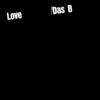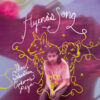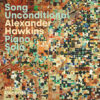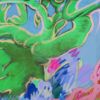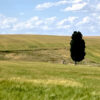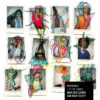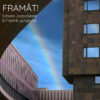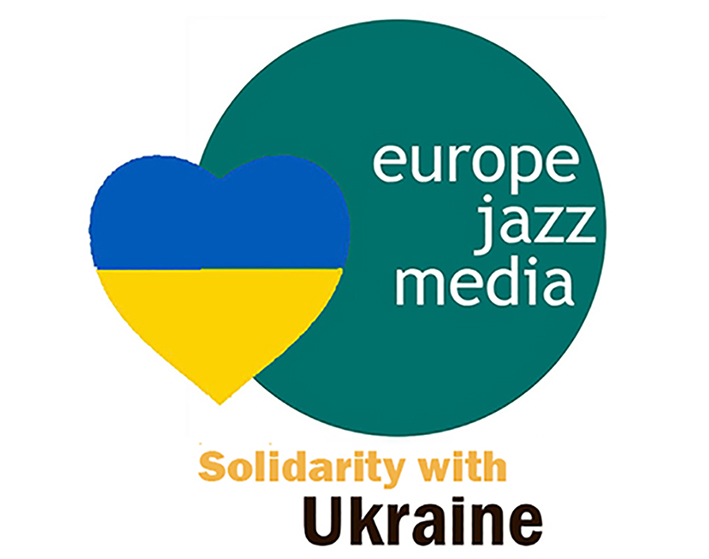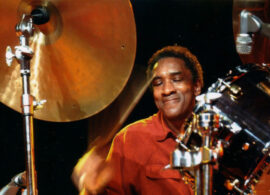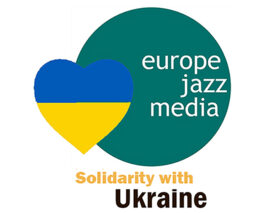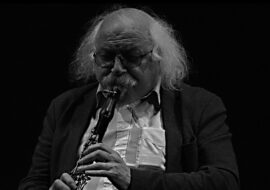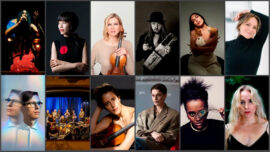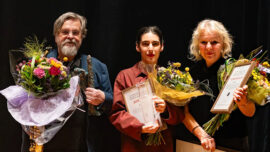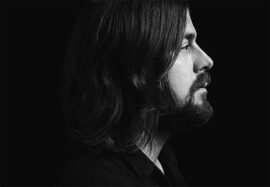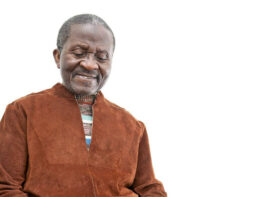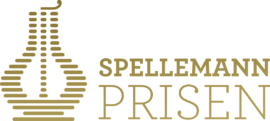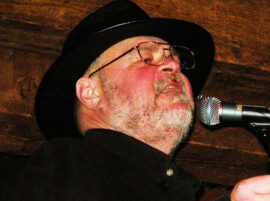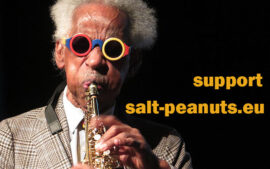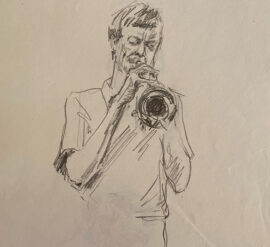Godt nytt år, ønsker vi alle våre lesere. Og med Europe Jazz Medias første chart for året, gir de beste jazzmagasinene i Europa gode tips på jazzutgivelser du kan starte det nye året med:
Patrik Sandberg, Orkesterjournalen:
JOACHIM KÜHN – Échapée (Intakt)
Cim Meyer, All That …:
OWLS – Wendolins Monocle (Intersections)
Matthieu Jouan, citizenjazz.com:
PAUL JARRET / KARIN JOHANSSON / DONOVAN VON MARTENS – Hémisphère / Hemisfär (Havtorn Records)
Luca Vitali, Giornale della Musica:
SYLVIE COURVOISIER – To Be Other-Wise (Intakt Records)
Yves Tassin, JazzMania:
JULIEN TASSIN, MANUEL HERMIA & CHRIS JORIS – Midnight Sun (Igloo Records)
Jos Demol, jazzhalo.be:
RENAUD GARCIA-FONS – Blue Maqam (L’Autre Distribution)
Kaspars Zavileiskis, jazzin.lv:
EKLEKTIKA – Encounters (self-released)
Jacek Brun, www.jazz-fun.de:
NIK BÄRTSCH’S RONIN – Spin (Ronin Rhythm Records)
Bega Villalobos, In&OutJazz:
THE ATTIC & EVE RISSER – La Grande Crue (NoBusiness)
Paweł Brodowski, Jazz Forum:
MIECZYSŁAW KOSZ – Debiut. Jazz Jamboree ’67/’68 (Polskie Radio)
Krzysztof Komorek, Donos kulturalny:
RADEK WOŚKO | KUBA WIĘCEK | GRZEGORZ TARWID – Radek Wośko Chamber Trio (Multikulti Project)
Jan Granlie, salt-peanuts.eu:
NOAH HOWARD GROUP – Berlin Concert and Schizophrenic Blues (Trost / CienFuegos)
Dick Hovenga, Written in Music:
JEFF PARKER ETA IVTET – The Way Out of Easy (Int. Anthem)
Viktor Bensusan, jazzdergisi.com:
EIVIND AUSTAD TRIO – Explore (Losen Records)
Nuno Catarino, jazz.pt:
ANDRÉ SANTOS – Vereda (Timbuktu Records)
Henning Bolte, freelance:
JAKOB BRO / LEE KONITZ / BILL FRISELL / JASON MORAN / THOMAS MORGAN / ANDREW CYRILLE – Taking Turns (ECM)
Tony Dudley-Evans, UK Jazz News:
JOHN HOLLENBECK & NDR BIGBAND – Colouring Hockets (NDR Flex 003)
Lars Mossefinn, Dag og tid:
HAYDEN POWELL – Undergrowth (Periskop)
Why did I choose –
Paweł Brodowski:
Mieczysław Kosz arrived on the scene in the late 1960s to become one of the leading Polish jazz pianists, next to Adam Makowicz and Włodzimierz Nahorny (who followed in the footsteps of Krzysztof Komeda, Andrzej Trzaskowski and Andrzej Kurylewicz). Blind by the age of 12, he honed a style that was an extension of Bill Evans, mixed with Polish romanticism and echoes of folk music. His promising career was cut abruptly by his tragic death in 1973 at the age of 29.
His legacy includes only one album released during his lifteme (Reminescence, 1973). In recent years there has been a renaissance of interest in his music (several books, a biopoic), and now Polish Radio is launching a whole series of records with archival material that has been resting in the vaults for over half a century. The first volume, Debiut. Jazz Jamboree ’67/’68, features live recordings from his trio concerts at the two subsequent Warsaw festivals. There are a few standards (“Israel”, “Summertime”, “Yesterdays”), there is a jazz rendtition of Chopin’s Prelude in C-Minor op. 28, and several of his own compositions showcasing his burgeoning talent. A rediscovered treasure.
Patrik Sandberg:
With this double album Joachim Kühn delivers us a stellar moment in the art of solo piano. Kühn has been one of the most outstanding musicians from contemporary jazz since the mid-1960s and has been captivating listeners for decades with his soulful piano sound and a ravenous drive for freedom. Échappée bears impressive witness to this relentlessness.
Cim Meyer:
The musical ambition of the second album from the Austrian group Owl is to use the metaphor of a mesocosmos – an experimental ecosystem. Owl is Simon Oberleitner (comp, p & electroacoustics), David Ambrosch (b) and Konstantin Kräutler-Horváth (d & sampling) and the essential guests: Veronika Morscher (voc), Herbert Walser-Breuß (tp / cnt) and Klaus Haberl (speech). They want to explore the smallest and the largest.
Oberleitner is inspired by what lies between fiction and reality, music and literature, science and philosophy, and between acoustics and electronics. The ten pieces of this release tell different stories. Some are instrumental, some have singing and words in English or German, that gives rise to reflection. Despite the versatility, most of it is welcoming and nice – although with dramatic sequences in between. All along, you can enjoy Oberleitner’s lyrical piano playing. Some may want to call for more edge – it may come with the group’s next release.
Viktor Bensusan:
Sublime yet mainstream avec d(u) Bowie …
Nuno Catarino:
Anchored in original compositions, the music evolves freely through the quartet’s dynamic interplay. The centerpiece, «Vereda,» a 29-minute track, transitions seamlessly between composed sections and improvisation, showcasing an open and evolving musical journey. Effortlessly elegant, the quartet’s music flows with cohesion and lightness.
Henning Bolte:
This wide, inner-waltzing, fathomed, shining, naturally charming music recorded more than a decade ago is a gem, diamond, a feast from the past throwing it’s heavy lightness far into the future.
Dick Hovenga:
From 2016, guitarist Jeff Parker, drummer Jay Bellarose, bassplayer Anna Butters and saxophonist Josh Johnson played weekly at the renowned club ETA in Los Angeles, which closed its doors in December 2023. Beginning as a group of musicians playing free versions of standards, they developed their own style and music. The recordings on The Way Out of Easy are all from one night in 2023. (A previous record (also very good by the way) on tiny Eremite Records called Mondays at The Anfield Tennis Academy and released in 2022 gained almost no attention). The Way Out of Easy has four long stretched free pieces. And by long, I mean 16, 17 or even 22 or 23 minutes. The band always takes ample time to tell their musical story where improvisation is the start and finish over carrying bass and drum parts. The Way Out of Easy is not only a very interesting record from a band that breaks down their seven years in ETA into four fascinating pieces, but also another extremely exciting and sparklingly adventurous Parker record. A great addition to his so rich oeuvre. But of course, in fairness, that goes for all four musicians.
Krzysztof Komorek:
The balance of the presence of the individual instruments are perfect, and the presence of electronics is almost imperceptible – helped by the subtlety of its dosage. On the other hand, the compositions, the trio’s collaboration and the interactions between the musicians are downright superb. Both in the more structured pieces and in the more open ones. Great example of modern, nuanced music. An album with no weaknesses.
Jacek Brun:
Nik Bärtsch is a composer who defies boundaries and canons. In his search for rhythmic connections and their combination with appropriate sounds, he leads us into a new musical world that fascinates and surprises us with its ideas and the consistency with which they are realized. It is music that is both exploratory and conscious, making us realize that the familiar can be used in completely new ways if only we trust and let ourselves be guided by the imagination of artists like him.
Bega Villalobos:
Rodrigo Amado – Gonçalo Almeida – Onno Govaert – Eve Risser
There are moments—and instruments—that change everything. If the saxophone-double bass-drums trio is an institution in the history of jazz, a fertile ground for exploration and freedom, a spark can ignite a process of expanding the spectrum of sonic possibilities and elevating the music to another level
Tony Dudley-Evans:
On this album the NDR Bigband perform nine of John Hollenbeck’s intriguing compositions. They are joined by special guests Matt Moran on vibes and Patricia Brennan on vibes and marimba who with the NDR percussionist Marcio Doctor and John Hollenbeck himself form a percussion quartet within the big band. The outstanding track is Cool Code featuring a fine solo from trumpeter Percy Pursglove.
Yves Tassin:
This Midnight Sun reveals an uncharted but accessible path through contrasting landscapes where a certain form of spirituality is never absent. (Pierre Dulieu)
Jos Demol:
Blue Maqam’ exudes lyrical musical philosophy of longing for peace and a new world, a clear ‘statement’ by Renaud Garcia-Fons, a feel-good uplift of stature. (Bernard Lefèvre)
Kaspars Zavileiskis:
The debut album of the new Latvian jazz fusion trio Eklektika, Encounters, features an unusual sound – the interplay of clarinet, tenor/baritone saxophones and drums. Artūrs Bariss, Rūdolfs Pēteris Rubenis and Kārlis Roberts Kalējs offer both references to earlier fusion and even progressive rock, as well as influences from the modern new wave of jazz fusion, represented by The Comet Is Coming, BadBadNotGood, Melt Yourself Down and other great bands. Eklektika defines itself as “drums with two horns”, which emphasizes the absence of harmonic instruments in the music they create – experimental, fresh and already performed with high quality in their debut album. Logically, the use of pedals and other effects is also present in the sound.
Matthieu Jouan:
This Franco-Swedish trio of three stringed instruments offers music that is evocative, ethereal and serene. By preparing their instruments or using extended techniques, the three performers respond to each other in a prepared abandon, a paradox that illustrates the light-hearted depth of the exchanges and the soaring sonorities. With a wide range of different and converging sounds for each instrument, the trio moves forward piece by piece, exploring new dreamlike landscapes with us. The three musicians, Paul Jarret – guitar, prepared guitar, Karin Johansson – piano, prepared piano and Donovan Von Martens – double bass, are among Europe’s sound seekers, and rightly so.
Jan Granlie:
Every now and then, old recordings of some of our past favorites surface. And now, out of the blue, two albums with saxophonist Noah Howard are coming with concert recordings from Berlin on January 30 and 31, 1975, and May 21 and 22, 1977, both recorded at the Quartier Latin club.
On both albums, we meet Howard on alto saxophone, on the first with Takashi Kako on piano, Kent Carter on bass, Oliver Johnson on drums and Lamont Hampton on percussion. While on the second, we meet him with trumpeter Itaru Oki, bassist Jean-Jacques Avenell and drummer Oliver Johnson.
Two releases that differ from each other in that the music on Berlin Concert is freer than that we get on Schizophrenic Blues, and together they form a good picture of Noah Howard from that important time in jazz history. Two fantastic reissues where we can hear his inspirations at the same time as they showing a creative musician who creates beautiful music on his own terms. The two records will be out January 17th.

